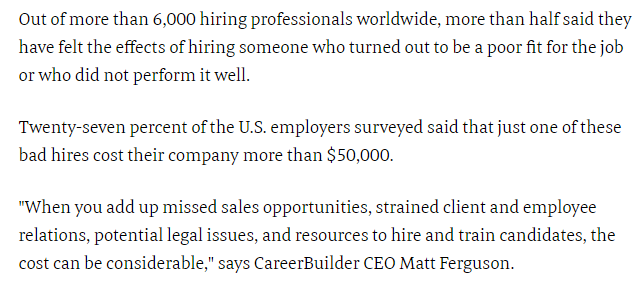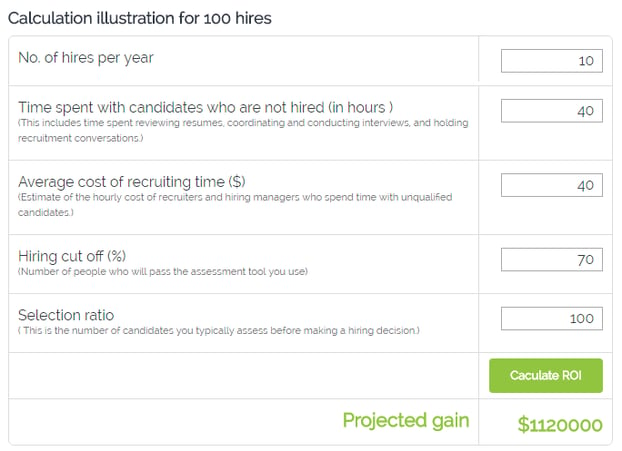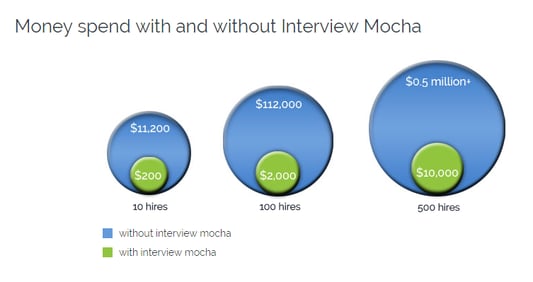Recently, the tech community celebrated the 20th anniversary of Java. It’s one of the most widely adopted programming languages, used for over the past two decades, and it is clearly not going go anywhere.
Additionally, demand for Java Developers is great, especially for companies that work on the latest application projects and applets. By that logic, shouldn’t there be an overabundance of Java developers in the industry? Moreover, shouldn’t there be so much money and time involved hiring the best Java Developers?
Although hiring costs vary by industry and region, it is always surprising to see the bottom-line figure, especially after all the costs have been factored in. The total cost of hiring one new developer can be as high as $5,000. There are recruiting costs, training, benefit packages, equipment, and more that need to be factored into the equation.
After a lot of research and inputs from customers, top thought leaders and reliable websites; iMocha, a AI-powered recruitment assessment tool has come up with more variables involved in calculating cost of a new hire.
Where is your money and time draining out?
The true cost of hiring a developer is much more than his salary. According to Bersin by Deloitte, it takes around $4000 to hire a developer.

There are too many expenses associated with hiring including the recruiter’s fee, administrative expenses, interview expenses, test creation, workplace integration, bad hires, etc. These are all the external and internal spending for recruitment in the designated time period.
Recruitment Costs
The cost of simply attracting the right person can be hefty. These costs add up to a major portion of your budget. The recruitment costs include administrative costs, third-party fees, such as agencies, advertising costs including job boards and social media, job fair and campus recruiting costs, travel expenses for recruitment, external assessments, background checks, and drug tests.
Test Creation Costs
It takes a huge amount of time and cost to crate tests. Involving technical experts to create tests on the amount of their work can cost you way too much to an organization. Chances are, the tests will be created, but other things will fall by the wayside.
Interviewing Costs
If you have to pay travel expenses, that's costly. But if all your candidates are local, you still have to take the time and cost of recruiter's assistant in reviewing resumes and performing other recruitment-related tasks. These tasks include calling and emailing candidates, conducting formal interviews, talking with colleagues, and figuring out who is the best candidate.
Training Costs
Attracting the candidates and recruiting is just the initial step, bringing in the candidate and training them is the most expensive. Training expenses such as training and orientation, employment testing, travel, hotel, and meals termination costs, unemployment, and potential litigation expenses if the candidate decides to sue you for wrongful dismissal, plus relocation costs, and outplacement or career transition costs are some other costs that you'd have to factor in.
Salary and Benefits Costs
The obvious cost of an employee is salary along with plus benefits packages. Development of the recruiting team, talent acquisition system costs–hardware and software, other fixed costs such as employee referrals, government compliance, etc. are included as well.
Bad Hires Costs
The cost of selecting the wrong person can run into thousands or even millions of dollars, not to mention the potential negative impact on a employees' morale and productivity. Unfortunately, making a bad hire can impact your revenue, your clients, your other employees, and you in a variety of ways.
Considering the results of a recent CareerBuilder survey, it costs more than $50,000 when the US employers hired poor-fit candidates for their job role.
 Your company loses more than time, money, and effort by recruiting, hiring and training people who perhaps shouldn't have been brought on in the first place.
Your company loses more than time, money, and effort by recruiting, hiring and training people who perhaps shouldn't have been brought on in the first place.
Another cost that shouldn’t be overlooked is the cost of workplace integration. There's also the cost of physical space as well as software, cell phone, travel, and any special equipment or resources required for the job.
No matter which recruitment methods you prefer, or what your budget is, your cost of hiring a developer should reflect on how you allocate resources to attract and hire the best talent.
How can iMocha help you save more than $1200 per hire?
Consider a scenario.
A business loses 6 employees in six months, averaging one per month.
Six of these employees were entry level, with an average salary of $40,000. It costs, on average, $16,000 to replace each employee at 40% of their annual salary, for $96,000 total.
On an average, it's going to cost your company $72,000 to replace the six entry level employees.
Numbers seem high!
With iMocha, the above numbers will surely lower down. Want to see how? This can be proven with the iMocha’s ROI Calculator.
iMocha ROI Calculator
The most visible short term benefit of using iMocha is the reduced administrative time and cost spent screening candidates.
However, it is hard to estimate the actual value of a good hire or the cost of a bad one. But below are some basic formulas to assist with building budgets and business cases for the use of iMocha as an assessment tool.

ROI Calculator gives you a clear view of time and costs wasted on unqualified Java developers hiring. And below you can see how much you can save using iMocha's pre-employment Java skill assessment test.

Implementing iMocha's online java programming tests result in incremental benefits, and using an ROI calculator can help demonstrate the returns a company can expect after implementing iMocha's Online Skill testing.
What have iMocha's Customers experienced after using java assessment test?
Apart from saving the cost and time in the hiring process, iMocha's customers have experienced many advantages right from creating a talent pipeline till hiring the best candidates for the job role. This is what customers have said:
- The hiring speed of the companies has increased dramatically by creating a talent pipeline, where applicants are evaluated.
- iMocha has helped companies to improve the time-to-fill candidates by 84% and 90% reduction in time for recruiting.
- With the help of iMocha, companies are now able to streamline resume screening, which takes up a significant portion of the total recruiting time.
- Companies are now able to screen a double number of developers. The conversion ratio in the face-to-face interviews has increased by 70%. The calculation is simple, if previously companies were screening 2 candidates out of 10, now they are able to screen 4 to 5 candidates. And now they spend time in assessing if the candidate will be a good fit for the organization.
And all this results in money saved.
Won’t you like to know how and with what all measures iMocha help companies to cut the irrelevant costs in hiring java developers?
Hire better and faster with iMocha Java Skills Assessments
iMocha’s Java tests enable employers to identify potential hires by evaluating working skills and job readiness. For this reason, the emphasis is laid upon evaluating the knowledge of applied skills gained through real work experience, rather than theoretical knowledge.
iMocha works toward helping hiring managers to quickly conduct the pre-hire screening and assessment for java developers.
Ready to use Java tests: iMocha has ready to use java tests so that you can easily and efficiently assess candidates on coding skills.
To help you narrow down, here is the breakdown of most popular and latest Java ready to use skills test. While this isn’t an exhaustive list, it does provide insight into the most in-demand programming tests sought after by employers.
Most Popular Java Tests
Core Java Test for Interview: Assess different core Java concepts like Java OOPs, string data handling, Lambda Function, Java 8–stream, collections, and more.
Java MCQ Test to Assess Java Architect: Quantify skills required for Java architect role such as annotation, request mapping, auto-wiring, aggregation functions, and more.
Java Machine Test to Hire Mid-Level Java Developer: This coding test contains coding problems with medium difficulty level and can be used to hire Mid-level Java developer.
Advance Java Online test to Hire Experience Developer: This coding test contains coding problems with high difficulty level and can be used to hire experienced Java developers.
Java Full Stack Developer Skill Test: Assess full stack Java developer skills like strings and regular expressions, Burndown chart, request mapping, collections, and more.
Java Descriptive Test: Assess Java developer skills like file, thread, strings JDBC, java array, Exception and more.
Liferay Developer Skills Test: Quantify skill like Liferay portlet applications, portlet classes, deployments in portlets, and more.
RESTful Test: Assess skills like JAX-RS based REST web services, RESTEasy based REST web services security and more.
Spring Boot Assessment Test: Employers can assess skills like Spring Boot annotations, Scripts, Dependencies, Security & Configuration, and more.
Spring MVC Online Test: Assess skills like Spring modules, ORM, Dependency Injection, Spring core, and more.
Java UI Developer Test: Evaluate skills like strings & regular expressions, template literals, Jquery effects, and more.
Hibernate Online Test: Assess skills like legacy Hibernate native queries, caching in hibernate, LockMode class, and more.
Latest Tests
Online Groovy Test: Quantify Groovy skills like Control Structures, OOPs, Gradle, Scripts, and more.
Grails Online Test: Evaluate skills like Commands, Controllers, Filters, GORM, Grail GSP, etc.
Online RichFaces Test: Assess skills like RichFaces Architectural Overview, Basic Components, etc.
PrimeFaces Online Test : Evaluate skills like Signature PrimeFaces component, TextArea PrimeFaces component,etc.
Seam and Weld Online Test: Assess skills like BOSS, Array in Seam, Data Model in Seam, etc.
EJB Online Test: Assess skills like EJB, EJB Instance Injection, Message Driven Beans, EJB Interceptors, and more.
JSF Online Test: Quantify skills like JSF 2, Backing Beans, JSF 2 Navigation, etc.
iMocha consistently tries to provide you with the relevant assessments of latest technologies.
Custom Tests: You can also create custom tests as per your specific requirements.
Type of questions: iMocha’s skill test library has more than fifteen java tests, which cover each and every topic and frameworks of java.
Quality of questions: iMocha has hundreds of java questions and each question is checked for its quality and correctness several times. Each question goes through a number of SMEs to validate.
Analytics: Using powerful analytics and reporting, you will have a detailed analysis of test results to help you make better decisions and predict candidate success.
Coding Simulator: iMocha provides Code Simulator for evaluating the coding style or knowledge of a candidate.
- This code simulator is available for seventeen different programming languages with basic to high-level question sets, including Java programming language. With every problem statement, four test cases are attached.
- With these test cases, iMocha’s code simulator evaluates the code and assigns the score to candidate’s answers. Now assess the candidate's coding skills rather just relying on practical knowledge.
While providing a one stop solution for screening Java developers, we make sure that our java skills assessment and java coding tests are based on the 'science of assessment' and 'quality questions'.
Looking into what the future holds the increased demand for Java developers, iMocha cares about the quality and importance of the analytics that you are hiring. Therefore, we make sure that you are guided in the process of selection of such.
iMocha advanced hiring analytics, assessment integration, and candidate ranking tools will help you streamline the selection process, ensuring best-fit and faster decisions. And, with iMocha, your pre-employment testing analytics will be taken care of.


